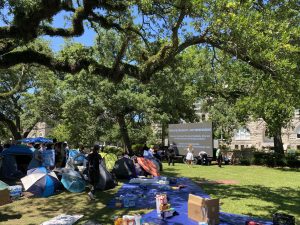No headline provided

October 7, 2011
Though she grew up in a privileged household in Mobile, Ala., Susan Tucker felt distant from white Southern society. Her father was not an Alabama native, and her mother enjoyed painting more than raising children. Tucker clung to her black maids, crossing a racial line that segregation often did not allow white children to see.
“It predisposed me to look at how we lived,” Tucker said.
At Tulane, Tucker works as Curator of Books and Records. She has 12 students who work with her to archive Newcomb College records and photograph albums.
Influenced by her childhood experiences, Tucker wrote “Telling Memories,” a collection of narratives of Southern domestic workers, which influenced author Kathryn Stockett’s novel, “The Help.”
“Telling Memories” contains 42 interviews with African-American domestic workers and white employers born between 1882-1960.
Tucker is often compared to Skeeter Phelan, a character from “The Help.” Tucker said she is not Skeeter but admits Stockett stole some similarities: her father, like a white character in the novel, was a doctor, and Eula Mae, another character, shares the same name as her childhood cook.
“[Kathryn] Stockett did call me,” Tucker said. “She needed to imagine someone for this character to write the book, so I’m sure she in part imagined Skeeter as me.”
Tucker learned the ropes in domestic work. When she was 21, she worked as an au pair for a French family, looking after five children, polishing shoes and ironing clothes. The experience sharpened her insight into being a domestic worker.
“If you work alone, it’s very disheartening,” Tucker said. “There are no co-workers to pass the time with.”
She sees the domestic workers during segregation as mediators between the white and black communities. These women would identify those in the white community were kind employers and who in the black community were good workers.
Tucker has also written “The Scrapbook in American Life” and contributed to “New Orleans Cuisine: Fourteen Signature Dishes and Their Histories.” Still, “Telling Memories” keeps coming back. Every year, people ask Tucker questions about it, especially in the wake of the movie version of “The Help.”
Tucker is currently writing an ethnographic work on her genealogy. In her view, public history begins with the family.
“Every article I’ve ever written comes from memory or how memory is shaped,” Tucker said.






















Leave a Comment